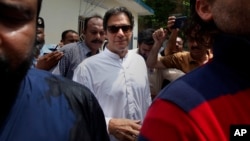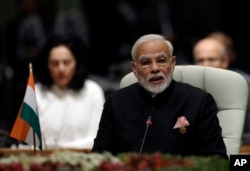Indian Prime Minister Narendra Modi spoke to Pakistan's prime minister-in-waiting, Imran Khan, Monday evening, congratulating him for his election victory and calling for both countries to “adopt a joint strategy” for improving bilateral ties.
Khan’s Pakistan Tehreek-e-Insaf (PTI) emerged as the largest political party in the July 25 parliamentary polls and appears set to lead a coalition federal government as well as in Punjab, politically important and the most populous of the country's four provinces.
“India desires progressive relations with Pakistan. Both countries must adopt a joint strategy to develop and strengthen better ties,” Modi told Khan, according to a statement by PTI.
The statement said that Khan thanked the Indian leader for the congratulatory message and warm wishes, and stressed the importance of dialogue for resolving bilateral disputes.
“Wars can breed tragedies instead of facilitating resolution of conflicts,” Khan told Modi, according to PTI.
An Indian statement issued after Modi spoke to Khan said the Indian prime minister expressed hope democracy would take a deeper hold in Pakistan and “reiterated his vision of peace and development in the entire neighborhood.”
Islamabad’s relations with New Delhi have deteriorated to historic lows in recent years, particularly since Prime Minister Modi’s government has taken charge.
The Indian leadership has been refusing to engage in peace talks with Pakistan, accusing the rival nation of covertly helping militants to plot attacks on Indian soil, including the 2008 Mumbai terrorist raids that killed over 166 people. Islamabad has rejected the charges and called for addressing mutual concerns through negotiations.
In his election victory speech on Thursday, Khan emphasized the need for the two countries to have a friendly relationship and invest in combating regional poverty. “We need to have trade ties, and the more we will trade, both countries will benefit,” he said.
Khan repeated Pakistan’s traditional stance that the divided Kashmir region was “a core issue” with India and called for leaders of the two countries to resolve it through table talks.
"It’s not going anywhere. We are at square one right now [with India]. If India’s leadership is ready, we are ready to improve ties with India. If you step forward one step, we will take two steps forward,” said the Pakistani prime minister-elect.
Kashmir has been the issue that sparked two of the three wars between India and Pakistan. The territorial dispute remains at the center of bilateral tensions.
There are long-standing fears another war could escalate into a nuclear exchange now that Indian and Pakistani armies both possess nuclear weapons.





